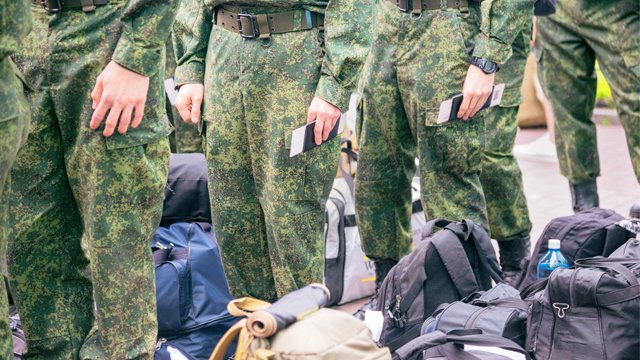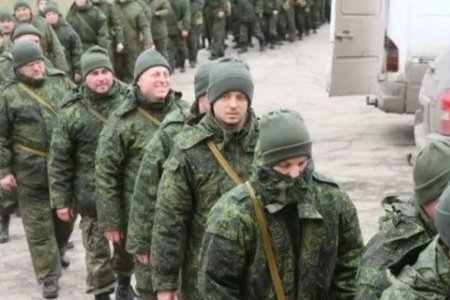
Russia does not need to keep any record of how many Ukrainian men, forcibly mobilized from occupied Donbas, are killed in the fighting, nor pay compensation to the men’s families. According to Serhiy Haidai, Governor of the Luhansk oblast, the Russians do not simply view these men as cannon fodder, but actively send them onto the frontline “as bait, to calculate where the fire from the Ukrainian Armed Forces is coming from.” Anybody is sent, regardless of their state of health.
The Luhansk Regional Administration posted a video from the self-proclaimed and Russian-controlled ‘Luhansk people’s republic’ [‘LPR’] on 21 August showing virtually only women and pensioners working at the Dovzhanska-Kapitalna coalmine. Nobody else remains after 430 miners were sent to the front. All of this is in breach of labour legislation, but the video tries to present it as something to be proud of, comparing it to the situation during the Second World War. Then, however, the Nazis invaded the Soviet Union, and every able-bodied man was needed to fight a savage invader. Here, the aggressor state, which is calling its full-scale invasion of Ukraine ‘a special operation’, is forcibly sending men from occupied territory to fight against their own fellow citizens, and probably be killed, as they are sent without any training. Russia’s use of fake ‘republics’ is enabling it to gain men whose deaths effectively nobody accounts for, or even tries to record.
As reported, in June the wives of men who had been forcibly ‘mobilized’ on 24 February from the so-called ‘Donetsk people’s republic’ [‘DPR’] issued a videoed appeal. They had heard nothing from their husbands, and had received no information about their whereabouts, since the men had been taken from their workplace on that day. The spokeswoman said that they had received information that the men were supposed to be returned to the unit on 6 June, however only unit (the fourth) from an entire ‘regiment’ had returned. Nobody would tell them where the other 200 men were.
She asserted that around 50% of the men were clearly in a bad physical state, but that there had been no medical commission (and, therefore, no examination). From the women’s account, it seems clear that any medical examination was pure fiction from the beginning of Russia’s full-scale invasion. This was months before the so-called ‘republics’’ admission in the second half of April that medical examinations had been cancelled.
Haidai reported on 13 August “new methods of forced mobilization”. These include tricking elderly people in apartment blocks to give them information about men of call-up age in exchange for food or small amounts of money. They also have people waiting outside the entrances to such blocks to catch men of the relevant age. Haidai notes that most of those engaged in such forced mobilization wear balaclavas when they move around the city to avoid being recognized by the neighbours or acquaintances whom they are hunting down.
The hunt has clearly not resulted in enough bodies to be sent to the frontline, and on 21 August Haidai reported that in some small cities in occupied Luhansk oblast, people have been offered 60 thousand roubles for disclosing the whereabouts of men. He notes that there are virtually no men left, but the pseudo-republic has ‘a plan’ to be fulfilled on quotas for forced mobilization.
“The Russians themselves don’t want to go into open battle so they continue to collect men on occupied territory who are then thrown into hell.”, Haidai writes.
Moscow is certainly eager to avoid mobilization in Russia and is resorting (as it did in 2014) to offering large amounts of money to so-called ‘volunteers’. Russian legislation does actually prohibit fighting as a mercenary, but nobody dares point out that this is exactly what is on offer. The same is true of the methods used to persuade convicted prisoners to go to fight in Ukraine, with large amounts of money and the waiving of their sentence offered – if they survive. In fact, like the Ukrainians forcibly mobilized from occupied territory, it is reported that such convicted prisoners are sent to the worst frontline positions and are most unlikely to return alive.
See also: Russian prisoners offered big money and ‘amnesty’ to kill for Russia in Ukraine



